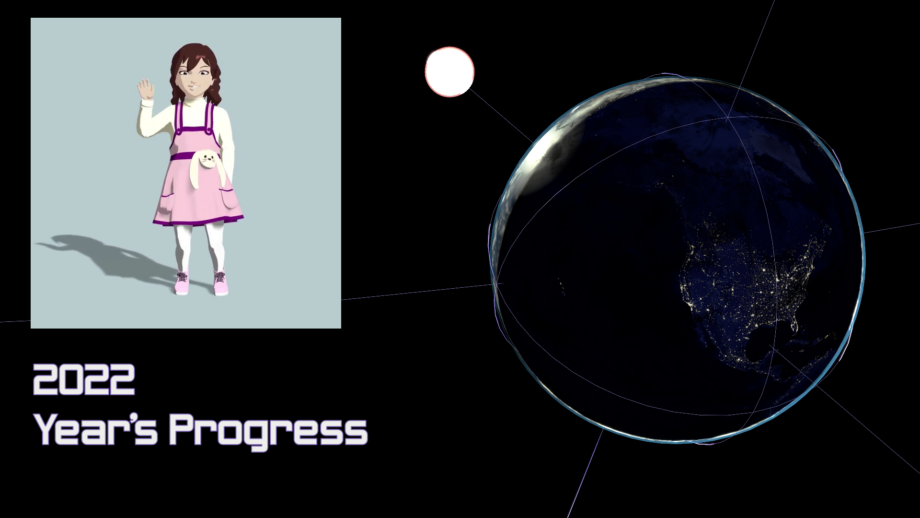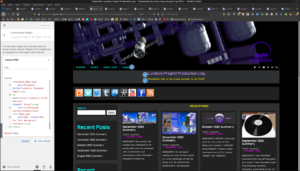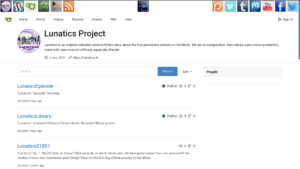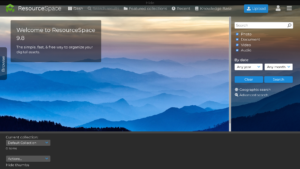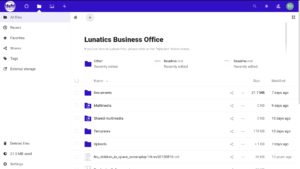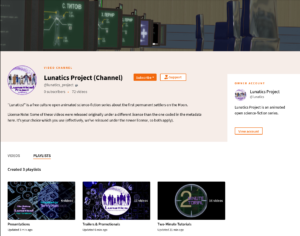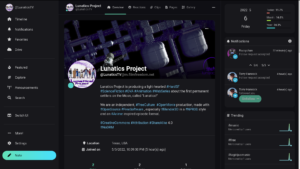2022 Year’s Progress
This was a very productive year for infrastructure work, and we also got some production done:
Fediverse
This year, the Fediverse finally broke out as a major force in social media (although it’s still a minority option, it is much more viable than it was). This was largely due to fallout from Elon Musk’s purchase of Twitter (renamed to “X” in one of the sillier aspects of that move), which is not really the way I had hoped it would work out, but in the end, this is still a good thing, because federated social media is an enormous improvement.
My own following went up from a few dozen to about a thousand in 2022, which is about twice as many followers as I had friends on Facebook and about 5-10 times as many followers as I had on Twitter or Tumblr. What’s more, the level of engagement is far higher, so the impact is even greater than these numbers imply. This is partly because there are basically no “bots” among my followers on the Fediverse, and because feed algorithms don’t bury my posts behind paid-promotion. This is a big improvement for marketing, although I’m still struggling with that.
So this year, I moved my social media “flag” from proprietary platforms (Facebook, Twitter, Tumblr) to free and federated ones (Mastodon, Hometown, Misskey).
YunoHost
Via the Fediverse, I have gotten back into the loop on developments in free software. Among these was my discovery of YunoHost, which gives me an intermediate between paying for platform services or paid hosting and having to install everything myself.
The notion behind YunoHost is making setting up a self-hosted server to be almost as easy as installing software on a regular desktop PC. To do this, existing applications are packaged as “YunoHost Apps” — which is basically an installer customized for the YunoHost system.
YunoHost is free software, based on the Debian distribution.
There are significant connections between YunoHost and Framasoft, which is an import free-software advocacy foundation in France.
I adopted YunoHost as my new solution for meeting my “Virtual Studio” goals for Lunatics Project.
This entailed testing and reviewing dozens of software packages. Ultimately I settled on a core system of:
- WordPress (for the Production Log, and a CMS for the project site)
- Gitea (for software and production repositories, migrated from Subversion)
- ResourceSpace (asset management, installed via “Custom Webapp”)
- Nextcloud (for business documents)
- PeerTube (for video hosting, largely replacing Vimeo)
- Misskey (for professional social media presence)
I tried using Ansible to deploy YunoHost (and the apps on it), but they have pretty different management concepts. Ansible is designed for repeatable deployments, which means making sure you are installing the same software, but YunoHost is designed around continuous integration, so the software packages are frequently updated. This means any combined approach is subject to a lot of uncertainty.
2-Minute 2-Torial
Since this year included the numerological event of “2022-02-22”, I decided to celebrate by posting another “2-Minute 2-Torial”, this time about Kdenlive (In fact, I called it “2-Layer Editing” to further capitalize on the event), which I published very near to 22:22 on the clock (my local time).
I was hoping to re-launch the tutorial series, and I made a new title graphic in Blender, but I didn’t stick with it, so this was basically a one-off.
Annual Report & Archives
I’ve attempted to do this before, but this year, I decided to merge my process for keeping Worklogs with my annual reporting and archival backups. So I created a 2021 Annual Report as a static copy of the “Summary” posts from 2021, as well as disks backing up the worklogs and project. I’m still working out the details, but this seems like a good practice.
Subversion-to-Git/GitLFS/Gitea
This year, I decided to follow the advice I keep getting about using Git instead of Subversion. This was also partly driven by the fact that there is no YunoHost app for Subversion (or Trac). So I made sure everything was checked in, and then ran scripts to convert my sources over.
The multimedia files are large, and really should be handled by GitLFS, so I implemented that. Unfortunately, this should really have been done prior to migrating from Subversion, because there were problems migrating the source (and particularly its past history) over to LFS.
Diffusion-Based AI Art (MidJourney, Craiyon, Stable Diffusion)
Another major event this year was the launch of several artificial intelligence services. Among these were prompt-driven AI art engines, the most notable being MidJourney. I did extensive experimentation with this in June to August of this year. Ultimately, I concluded it had limited applications for production work, but it is a fast way to generate textures and back-of-shot elements. It’s also very fun to play with, and I used it to generate some avatars I can use on social media and similar low-stakes stuff.
I turned a couple of the experiments into “Log Extract” videos, as a potential new series of behind-the-scenes content:
Ultimately, I learned that this technology can be installed locally with “Stable Diffusion” which is an open-source diffusion package (in fact, I think it’s what MidJourney is running on their server, but I’m not sure). However, it usually relies on strong GPU support, and I have not attempted to install it locally. Perhaps a future project?
Lunatics Production
As Fall approached, I started working on the new production assets I needed for “Lunatics”, including developing the control panel for Georgiana’s PLSS pack, so that we can do a shot of the technician working the controls. I had gotten very frustrated trying to make the movement look nature for the shot where the technician checks Georgiana’s controls and talks to her. In the end, I decided it would be simpler to do by cutting away to a close-up.
Keeping in mind that we’ll be needing to make a lot of props like this in the future, I also started a control-panel library, with buttons, switches, lights, and so on. This was largely taken from the existing Soyuz control panel, but also includes some new ones I modeled for the PLSS prop.
I also corrected some of the animation for the “Soyuz Flight” sequence. By default, Blenders applies “easing” to animation, which caused the stage separations to mysteriously slow down towards the end of the shots. I needed to take that out, making the animation linear. It’s subtle, but it was important to fix.
Pepper & Carrot
Ariel was invited back to voice “Saffron” again in Episode 3 of Pepper & Carrot, for Morevna Project. So we recorded that this year. We also had the honor to be one of the “Premiere Hosts” for that show and also Episode 4 on PeerTube:
Bunsen Disc Duplicator Project
In early December, I purchased a Blu-Ray M-Disc writer and adapter components which I used to upgrade the Primera Bravo II Disc Duplicator to be able to write the M-BD-R discs I want to use for Lib-Ray release media and other data storage.
This is a pre-requisite for developing the control software, and of course, necessary if we want to produce such disks on-site. As far as I know, there is not a commercial disk duplication company providing this service, so if we want them, we’ll probably have to make them ourselves.
Social Media Art
For the Film Freedom Misskey site, I wanted to have a lot of custom emoji art, featuring free-culture film characters from Blender films, Pepper & Carrot, Morevna, Lunatics, and so on. I made a lot of these in December. A small selection:
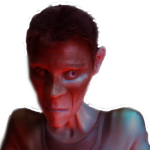 |
 |
 |
 |
 |
 |
 |
 |
 |
 |
 |
 |
 |
 |
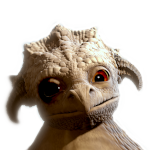 |
 |
 |
 |
 |
 |
 |
 |
 |
 |
 |
